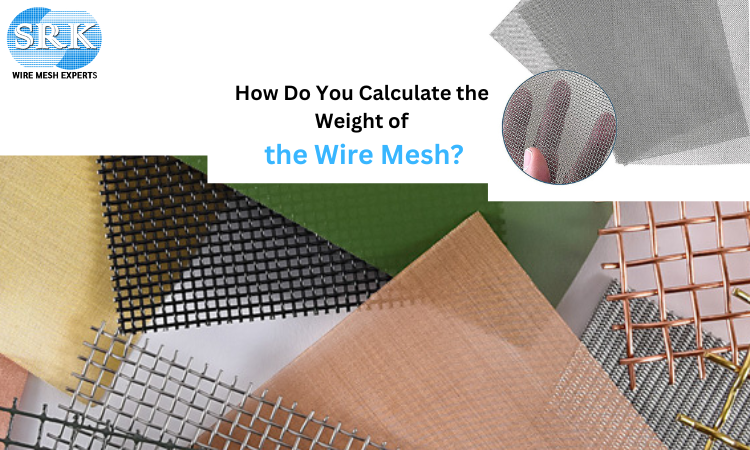To ensure that your project can endure any structural obstacles, you must compute the wire mesh weight before making any purchases. Now, you must determine its essential dimensions—mesh count, micron ratio, aperture, length, breadth, and wire diameter. In order to compute the wire mesh weight per square meter, or welded wire mesh weight per square meter. The total weight of the wire mesh is greatly influenced by each of these parameters. As you build a wall or install a fence or boundary to strengthen the protection process, carefully assess the project’s success.
In order to help you with your next projects, we have created this blog post that will walk you through the process of calculating the weight of wire mesh in a formulaic manner. Let’s see how the different dimensions impact the wire mesh total weight:
Wire Mesh Dimensions are Required for the Weight Calculation
Mesh count: The mesh count number indicates the number of openings or apertures in keeping with the linear inch in a woven wire mesh. A better mesh count denotes finer openings, essential for precision programs like filtration and separation.
Wire Diameters: Measured as the full thickness of the wire, the wire mesh’s diameter is another essential element in determining wire mesh and wire mesh specifications. The wire diameter, specified in gauge or millimeters, extensively influences the mesh’s strength and durability. Thicker wires provide robustness but might also lessen flexibility, at the same time as thinner wires provide finer information, albeit with decreased energy.
Micron rating: This is a measurement of the mesh’s pores or openings, commonly expressed in microns (µm). Filtering programs require it, as it specifies the maximum particle size that the mesh panel allows to skip. As a result, it’s vital for the proper retention or allowance of certain particles.
Aperture (opening size): The size of each man or woman beginning in the wire mesh is referred to as the aperture. Typically, the clear beginning between the wires or the distance between the facilities of two neighboring wires is used to quantify it. This measurement is vital to confirming whether or not the mesh is suitable for certain substances or no longer.
Duration: The duration of the woven wire mesh refers back to the horizontal measurement of the mesh panel within the course of the wires. It also includes measurements laid out in millimeters (mm) or meters (mtr). The mesh sheets or rolls with extra length weigh more than the shorter ones.
Width: In contrast to duration, the width of the mesh refers back to the vertical size throughout the wire of the mesh sheet. It is also measured in millimeters (mm) or meters (mtr). It has a tremendous courting with the wire mesh weight, with a bigger width similar to an extra weight.
Length: The length of the wire mesh refers to the horizontal measurement of the mesh in the direction of the wires. It is usually specified in millimeters (mm) or meters (mtr). The mesh sheets or rolls with more length weigh more than the shorter ones.
The Formula for Weight Calculation of Wire Mesh
|
Size in inches |
Measurement inputs | Weight (kg) |
| 1 * 1 | wire dia (mm) x wire dia (mm) x mesh number x width (mtr) x length (mtr) /2 |
kg |
There are various wire mesh sizes available on the market as per the varying demands of customers. One can easily customize the dimensions of a wire mesh in order to attain a desired weight that will withstand the project’s potential and structural challenges.
Let’s compute the wire mesh weight with different dimensions:
Example 1:
Mesh infographic with these measurements
Here, the given mesh is 4 x 4 inches. The length of the mesh is 30 mtr, the width is 1.2 mtr, and the diameter is 2mm.
Solution:
Formula: wire diameter (mm) x wire diameter (mm) x mesh number x width (meter) x length (meter) /2 = weight in kg
- Mesh#= 1”/Opening or Aperture in Inch
- So, Mesh = 1/4 = 0.25 Mesh
- Wire Dia = 2.0mm
- Put in the formula: (2x2x0.25×1.2×30)/2.
- =(36)/2
- = 18 kg +/- 5% tolerance
Example 2:
Mesh infographic with these measurements
Here, the given mesh is 1 x 1 inch. The length of the mesh is 15 mtr, the width is 2 mtr, and the diameter is 1 mm.
Solution:
Formula: wire diameter (mm) x wire diameter (mm) x mesh number x width (meter) x length (meter) /2 = weight in kg
- Mesh#= 1”/Opening or Aperture in Inch
- Mesh= 1/1= 1 Mesh
- Wire Dia= 1.0mm
- Put in the formula: (1x1x1x2x15)/2.
- =(30)/2
- = 15 kg +/- 5% tolerance
What is the formula for wire mesh?
The method for calculating the weight of wire mesh is based on several key measurements. Those encompass the diameter of the wire utilized in building the mesh, the total number of meshes, as well as its length and width. These parameters together contribute to the dedication of the wire mesh’s weight.
As soon as these measurements are obtained, they’re inputted into a specific formula designed for computing the load of the wire mesh. The formula is as follows:
Weight of wire mesh = wire dia (mm) x wire diameter (mm) x mesh wide number x width (mtr) x length (mtr) /2.
How much weight can wire mesh hold?
The amount of weight a wire mesh can preserve depends on various factors, consisting of the kind and gauge of the wire, the mesh size, the material it is made from (together with steel, aluminum, or other alloys), and the method of setting up and assisting.
Usually, a wire cloth can support a decent quantity of weight, mainly if it is crafted from sturdy materials like metal. However, it’s crucial to keep in mind the particular amount of weight the wire mesh can maintain; it is definitely dependent on its application, means of load, and any producer’s specification or load-bearing capacities supplied to the mesh.
If you have a particular kind or reason in mind for the wire mesh, it might be useful to discuss it with the manufacturer or an engineer who can offer more specific facts primarily based on your necessities.
How much does wire mesh weight?
The weight of wire mesh can vary widely depending on several factors, such as the type of metal used, the gauge (thickness) of the wire, and the dimensions of the mesh.
For example, a square foot of standard steel wire mesh with a mesh size of 4×4 and a wire gauge of 10 might weigh around 0.57 kg. However, this can change significantly based on the specific specifications of the wire mesh.
If you have specific details or measurements of the wire mesh, you can use the given wire mesh weight calculator, which provides you with a more accurate estimate.
What is the weight of wire mesh per square meter?
The weight of the wire mesh per square meter is also calculated with similar dimensions. Such as wire diameter or the total number of meshes per square.
To calculate the weight per square meter, the formula is wire diameter x wire diameter x mesh number divided by 2, which equals the weight in kilograms per square meter.
Wire diameter x wire diameter x mesh number/2 = kg (sqm).
Wire Mesh Weight Calculator
Here is the calculator for measuring the weight of the wire mesh, given for your reference. It will help you measure the weight of the wire mesh by using the dimensions that are necessary for your project. Also, it works as a welded wire mesh weight calculator that easily computes the weight of a mesh in a couple of seconds.
Calculator
In conclusion, if someone is looking to install a wire mesh, firstly, the customer is familiar with the terms of how to choose wire mesh and for what purpose. Then it is important to measure the weight of a mesh by using the various dimensions. The dimensions include its length, width, diameter, and the number of meshes in an inch. The calculator below will help you determine the weight of your wire mesh. According to the project requirements.
If you are looking for wire mesh, then SRK Metals is the place where you will find the ultimate solution. We offer a variety of meshes in response to your project’s requirements. With strong dedication and innovation, we have established ourselves in the wire mesh industry with a range of quality products across various sectors, including filtration, separation, screening, protection, and many others. For fulfilling your project needs with advanced solutions, please contact us, and we will provide you with the best suitable wire mesh options that withstand your project needs.

